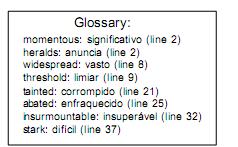Simulado UFF de Inglês | VESTIBULAR
📚 Simulado UFF | Vestibular | cód.8092
O segredo da aprovação está nos treinos. E esse simulado UFF é seu melhor aliado! 🎯
🎯 São milhares de simulados para concurso disponíveis para você praticar e conseguir a tão sonhada aprovação em Concurso Público.
🧪 Este Simulado UFF foi elaborado da seguinte forma:
- 📌 Categoria: Vestibular
- 🏛️ Instituição: UFF
- 👔 Cargo: Vestibular
- 📚 Matéria: Inglês
- 🧩 Assuntos do Simulado:
- 🏢 Banca Organizadora: UFF
- ❓ Quantidade de Questões: 17
- ⏱️ Tempo do Simulado: 51 minutos
⚙️ REGRA DO SIMULADO
Este simulado é gratuito 🆓. Basta clicar no botão iniciar abaixo e preencher um breve cadastro para participar do nosso ranking.
📊 No ranking você compara sua nota com outros candidatos e acompanha sua evolução nos estudos.
🚀 Aproveite este simulado UFF e saia na frente na sua preparação!
📖 Questões UFF
Se ainda não estiver pronto para fazer o simulado, treine antes com nossas questões de concursos:
🎥 Vídeo Aula
Confira vídeo aulas no YouTube com foco no concurso UFF. Estude com conteúdo gratuito e atualizado.
📚 Apostila
Encontre apostilas completas e materiais didáticos atualizados para o concurso UFF.
📢 Concursos Abertos para UFF
Veja os concursos abertos da instituição UFF. A lista está sempre atualizada:
🍀 Boa sorte e Bons Estudos,
ConcursosAZ - Aprovando de A a Z ✅
- #120860
- Banca
- UFF
- Matéria
- Inglês
- Concurso
- UFF
- Tipo
- Múltipla escolha
- Comentários
- Seja o primeiro a comentar
(1,0) 1 -
In the last paragraph, the text discusses the challenge humanity has to face to overcome its radical crisis. Such challenge can be understood as a:
- a) “In some cultures “yes” means “I hear you” more than “I agree.” (line 5)
- b) “Paying attention to customs and cultural differences can give someone outside that culture a better chance by assimilation and acceptance.” (lines 13-14)
- c) “Stereotyping can have intense negative effects, especially when educators or managers make fewer attempts to involve those of other cultures […].” (lines 23-24)
- d) “Don’t be afraid to ask questions as most people respond very positively to inquiries about their culture.” (lines 31-32)
- e) “When the exterior is peeled off, there are not many differences after all.” (line 39)
- #120861
- Banca
- UFF
- Matéria
- Inglês
- Concurso
- UFF
- Tipo
- Múltipla escolha
- Comentários
- Seja o primeiro a comentar
(1,0) 2 -
EXEMPLIFICATION is used by the author of the text to develop his argumentation. In paragraph 7, through the use of exemplification, the author
- a) lists types of social behavior which may positively affect cross-cultural communication.
- b) may lead people to misunderstand other people’s social conventions.
- c) can get a balanced view of the literary and cultural contributions of a particular society.
- d) may lead people to appreciate other people’s literatures.
- e) does not affect social interaction.
- #120863
- Banca
- UFF
- Matéria
- Inglês
- Concurso
- UFF
- Tipo
- Múltipla escolha
- Comentários
- Seja o primeiro a comentar
(1,0) 3 -
In “There is much to be gained by observing how people of the same culture interact with each other” (lines 30-31), the expression in bold could be replaced by
- a) both.
- b) neither.
- c) everyone.
- d) one another.
- e) each one.
- #120865
- Banca
- UFF
- Matéria
- Inglês
- Concurso
- UFF
- Tipo
- Múltipla escolha
- Comentários
- Seja o primeiro a comentar
(1,0) 4 -
Discourse markers are used to provide cohesion to the text. In the excerpt “Hence, we are comparing two bell curves and generalization cannot be avoided” (lines 17-18), the discourse marker in bold expresses the following semantic relation:
- a) time.
- b) concession.
- c) consequence.
- d) emphasis.
- e) manner.
- #120868
- Banca
- UFF
- Matéria
- Inglês
- Concurso
- UFF
- Tipo
- Múltipla escolha
- Comentários
- Seja o primeiro a comentar
(1,0) 5 -
According to what is stated in the 2nd paragraph, offering a seat on the bus to an older person is an example of
- a) greeting.
- b) gallantry.
- c) affection.
- d) acceptance.
- e) rudeness.
- #120869
- Banca
- UFF
- Matéria
- Inglês
- Concurso
- UFF
- Tipo
- Múltipla escolha
- Comentários
- Seja o primeiro a comentar
(1,0) 6 -
The meaning of unsuspecting (line 14) is
- a) incriminating.
- b) ingenious.
- c) suspicious.
- d) guilty.
- e) innocent.
- #120873
- Banca
- UFF
- Matéria
- Inglês
- Concurso
- UFF
- Tipo
- Múltipla escolha
- Comentários
- Seja o primeiro a comentar
(1,0) 7 -
According to Text I, in order to interact successfully with people from a different culture, one must
- a) observe people’s cultural behavior carefully.
- b) generalize social behavior.
- c) avoid eye contact.
- d) ignore people’s cultural differences.
- e) speak their language fluently.
- #120874
- Banca
- UFF
- Matéria
- Inglês
- Concurso
- UFF
- Tipo
- Múltipla escolha
- Comentários
- Seja o primeiro a comentar
(1,0) 8 -
The title of Text I reflects the author’s position regarding culture. Choose the statement in which this position is best conveyed.
- a) Individual differences should not be taken into account when trying to understand people’s culture.
- b) People should make genuine efforts to understand other people’s culture.
- c) Differences between people add richness to the fabric of life.
- d) Although there are cultural differences between nations, people everywhere have a lot in common.
- e) Traditions contribute to assimilate not only culture but language as well.
- #120876
- Banca
- UFF
- Matéria
- Inglês
- Concurso
- UFF
- Tipo
- Múltipla escolha
- Comentários
- Seja o primeiro a comentar
(1,0) 9 -
In the last paragraph, the text discusses the challenge humanity has to face to overcome its radical crisis. Such challenge can be understood as a:
- a) prophecy;
- b) query;
- c) justification;
- d) denial;
- e) promise
- #120877
- Banca
- UFF
- Matéria
- Inglês
- Concurso
- UFF
- Tipo
- Múltipla escolha
- Comentários
- Seja o primeiro a comentar
(1,0) 10 -
Choose the item which signals, in the second paragraph, a change of opinion concerning human intelligence.
- a) even
- b) more recently
- c) no doubt
- d) yet
- e) other
- #120879
- Banca
- UFF
- Matéria
- Inglês
- Concurso
- UFF
- Tipo
- Múltipla escolha
- Comentários
- Seja o primeiro a comentar
(1,0) 11 -
Observe this extract from the text: “The achievements of humanity are impressive and undeniable”. (lines 15-16) More recently, however, there has been a radical change in the way humanity behaves toward the evolution of the planet. Mark the option which best characterizes this attitude.
- a) Science and technology.
- b) Human consciousness.
- c) Individual life-form.
- d) Evolutionary leap.
- e) Collective insanity.
- #120881
- Banca
- UFF
- Matéria
- Inglês
- Concurso
- UFF
- Tipo
- Múltipla escolha
- Comentários
- Seja o primeiro a comentar
(1,0) 12 -
In the extracts below, the words with ‘ing’ are all verbs, except:
- a) “humans are inflicting on other life-forms” (line 27);
- b) “this dysfunction is actually intensifying” (line 24);
- c) “sublime works of music, literature, painting, architecture and sculpture” (lines 17-18);
- d) “the old way of being in the world” (line 31);
- e) “responding to this radical crisis” (line 35).
- #120882
- Banca
- UFF
- Matéria
- Inglês
- Concurso
- UFF
- Tipo
- Múltipla escolha
- Comentários
- Seja o primeiro a comentar
(1,0) 13 -
In the fourth paragraph, the repetition of the connective WHEN indicates:
- a) denial;
- b) emphasis;
- c) doubt;
- d) comparison;
- e) reason.
- #120884
- Banca
- UFF
- Matéria
- Inglês
- Concurso
- UFF
- Tipo
- Múltipla escolha
- Comentários
- Seja o primeiro a comentar
(1,0) 14 -
In the text, the role of science and technology in the achievements of humanity is viewed as one of contrast. Mark the option that best characterizes such a role.
- a) Miraculous and destructive.
- b) Radical and extinct.
- c) Impressive and sublime.
- d) Evolutionary and intensifying.
- e) Undeniable and isolated.
- #120885
- Banca
- UFF
- Matéria
- Inglês
- Concurso
- UFF
- Tipo
- Múltipla escolha
- Comentários
- Seja o primeiro a comentar
(1,0) 15 -
The text discusses the collective dysfunction of the human mind. It gives as examples the destruction of oxygen-producing forests and other plant and animal life; ill-treatment of animals in factory farms; and poisoning of rivers, oceans and air. The reason for this behavior is:
- a) lack of choice and insurmountable problems;
- b) explosion of color and scent;
- c) planet’s survival and evolution of species;
- d) isolated phenomena;
- e) human’s greed and ignorance.





